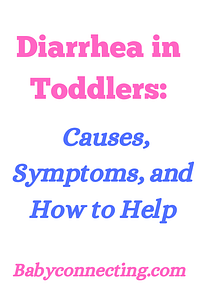“Understanding Diarrhea in Toddlers: Causes, Symptoms, and How to Help”
Introduction:

Diarrhea is a common issue for toddlers and can be worrying for parents. But understanding its causes, recognizing the symptoms, and knowing how to provide the right treatment can help ease concerns.
In this article, we’ll explore diarrhea in toddlers in simple terms, covering its causes, symptoms, and effective treatments. We’ll also include research references to provide reliable information and deepen your understanding of this topic.
Causes of Diarrhea in Toddlers:
Diarrhea in toddlers can have various causes, including:
1. Viral Infections
Common viruses like rotavirus and norovirus can lead to diarrhea.
2. Bacterial Infections:
Bacteria such as E. coli, Salmonella, or Campylobacter can cause diarrhea, often due to contaminated food or water.
3. Food Intolerance:
Certain foods or ingredients, such as lactose or gluten, may trigger diarrhea intoddlers with sensitivities.
4. Medications:
Antibiotics, in particular, can disrupt the balance of bacteria in the gut and lead to diarrhea.
5. Other Factors:
Intestinal parasites, food poisoning, or changes in diet or routine can also contribute to diarrhea episodes.
Symptoms of Diarrhea in Toddlers:
Recognizing the symptoms of diarrhea can help parents respond promptly. Common symptoms include:
1. Frequent, Loose Stools:
Diarrhea is characterized by watery or loose stools that occur more frequently than usual.
2. Abdominal Cramps:
Toddlers may experience stomach pain or cramps along with diarrhea.
3. Nausea and Vomiting:
Some toddlers may also vomit in addition to having diarrhea.
4. Fever:
Infections causing diarrhea may be accompanied by fever, though not always.
5. Dehydration Signs:
Watch for signs like dry mouth, decreased urination, sunken eyes, or lethargy, which indicate dehydration.
Treatment for Diarrhea in Toddlers:
Managing diarrheain toddlers often involves:
1. Fluid Replacement:
Offer plenty of fluids, such as water, oral rehydration solutions, or diluted fruit juices, to prevent dehydration.
2. Dietary Adjustments:
Avoid fatty, spicy, or sugary foods and opt for bland, easily digestible foods like rice, bananas, applesauce, or toast (BRAT diet).
3. Probiotics:
Some studies suggest that probiotics can help shorten the duration of diarrhea in children.
4. Medication for Diarrhea:
Over-the-counter anti-diarrheal medications are generally not recommended for toddlers, especially without consulting a healthcare provider.
Research References:
1. Guarino, A., Ashkenazi, S., Gendrel, D., Lo Vecchio, A., Shamir, R., & Szajewska, H. (2014). European Society for Pediatric Gastroenterology, Hepatology, and Nutrition/European Society for Pediatric Infectious Diseases evidence-based guidelines for the management of acute gastroenteritis in children in Europe. Journal of Pediatric Gastroenterology and Nutrition, 59(1), 132-152.
2. Farthing, M., Salam, M. A., Lindberg, G., Dite, P., Khalif, I., Salazar-Lindo, E., … & Goh, K. L. (2013). Acute diarrhea in adults and children: a global perspective. Journal of Clinical Gastroenterology, 47(1), 12-20.
Conclusion:
Diarrhea is a common occurrence in toddlers, often caused by infections, food intolerances, or changes in diet. Recognizing the symptoms and providing appropriate treatment, such as fluid replacement and dietary adjustments, can help manage diarrhea effectively. However, it’s crucial to monitor for signs of dehydration and seek medical advice if symptoms persist or worsen. With proper care and attention, most cases of diarrhea in toddlers resolve without complications, allowing them to recover and return to their playful selves.a,, is


